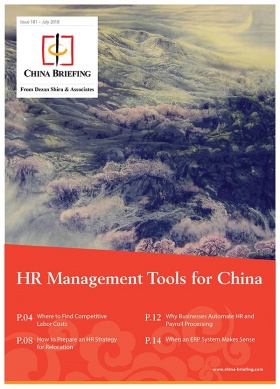China Work Permits No Longer Needed for Taiwan, Hong Kong, and Macau Residents
On August 3, 2018, the State Council announced that residents of Taiwan, Hong Kong, and Macau (‘THKM’) will no longer require work permits to work in mainland China.
In effect, this means that – at least for employment purposes – residents from these three regions will be treated the same as local mainland Chinese residents.
However, THKM residents will continue to be treated differently than mainland Chinese residents in a number of employment-related areas, including social insurance benefits.
Nevertheless, the policy reform cuts administrative red tape for THKM jobseekers, and simplifies the hiring process for employers.
What is the change?
Previously, under the Administrative Regulations on Employment of Taiwan, Hong Kong and Macau Residents in Mainland, residents from THKM regions were required to obtain a work permit (known as the 台港澳人员就业证) before working in mainland China.
A THKM resident was required to submit up to 10 items of paperwork (e.g. employer’s business license, employee’s health certificate, valid travel documents) in order to obtain a work permit.
While the process for THKM residents to acquire a work permit was already significantly less onerous than that required of foreign applicants—generally taking only 1-3 weeks to complete—under the new legislation, the process of applying for a work permit has been removed completely.
Additionally, the work permit system meant that THKM residents were required to apply for a new permit when switching employers and would be subject to the permit’s two-year renewal period.
In lieu of the work permit system, THKM residents can now use their business license, labor contract, wage payment documents, or social security payment records as evidence of employment in mainland China. Additionally, they will now be eligible to register for unemployment benefits.
Separately, the State Council announced that further measures will be released to guide the Ministry of Human Resources and Social Security to facilitate these new measures and to strengthen its supervision of employment services, social security, unemployment registration, and labor rights protection.
Incentives for THKM workers
The policy change is part of the Chinese government’s ongoing efforts to establish a ‘unified China’, by encouraging THKM residents to work in the mainland.
The changes were praised by Hong Kong’s pro-Beijing Democratic Alliance for the Betterment and Progress of Hong Kong, which said that it made Hong Kong residents more “employable.” The party stated that the measures “will prevent mainland enterprises from refusing to recruit Hongkongers due to complicated procedures.”
Despite the elimination of work permits for THKM residents, they will still be treated differently than mainland Chinese workers in certain areas, such as for access to healthcare and pension benefits. For example, THKM residents will still have to pay for medical services in public hospitals in full before seeking reimbursement for social insurance—if provided by their employers.
In addition to increased working rights, the Chinese government offers a variety of incentives to attract THKM residents. For example, in July, the Guangdong provincial government announced measures providing Taiwanese residents with the same investment, employment, and study rights as mainland Chinese residents in a number of areas.
The administrative measures on THKM work permits were one of eleven abolished by the State Council last week, in efforts to cut the red-tape and streamline approval processes. Amongst the 11 other measures scrapped by the State Council last week were: business registration for enterprise group, preliminary approval for overseas investment by domestic companies and registration for subsidiaries.
About Us
China Briefing is produced by Dezan Shira & Associates. The firm assists foreign investors throughout Asia and maintains offices in China, Hong Kong, Indonesia, Singapore, Russia, and Vietnam. Please contact info@dezshira.com or visit our website at www.dezshira.com.
- Previous Article China-Africa Trade to Benefit from Growing Economic Cooperation
- Next Article How to Save VAT on Cross-border Transactions in China








